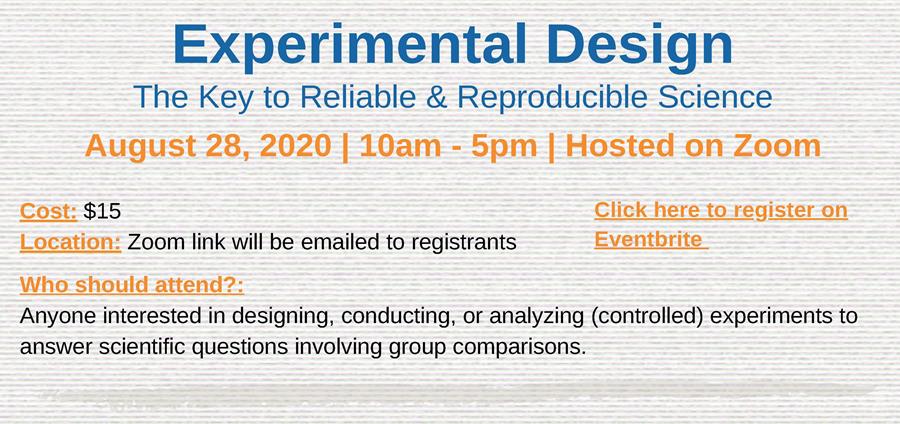
- This event has passed.
Experimental Design – The Key to Reliable & Reproducible Science
August 28, 2020 @ 10:00 am - 5:00 pm
$15Event Navigation

Who should attend?
Anyone interested in designing, conducting, or analyzing (controlled) experiments to answer scientific questions involving group comparisons.
Description:
Obtaining reliable and reproducible estimates of a “treatment” effect and drawing conclusions in any scientific context hinges on sound study design. No statistical analysis can salvage a poorly designed study. Before rushing to pick the “ideal” statistical analysis, we must think about the scientific objective and aims and ask: what is the scientific question of interest?
Then we will examine how and why the design of a study can greatly impact the reliability of results and the conclusions we can draw from any data analysis. How we design a study and collect data will determine the generalizability of results, including whether reproducing findings in future studies would be a reasonable endeavor. To this end, the overall goal of this short course is two-fold: (1) to introduce and motivate experimental design, and (2) to explore the utility and appropriateness of different types of experimental designs, including clinical trials, to address a given scientific question of interest.
This short course is geared towards individuals who are interested in designing, conducting, or analyzing (controlled) experiments to answer scientific questions involving group comparisons (e.g., difference in means between two groups). While familiarity with analytic approaches to compare means between two groups (t-test), more than two groups (analysis of variance, ANOVA), and many more than two groups (linear regression) can be helpful, the intention of this course is not to delve into statistical theory. Instead, the focus will be to explain core concepts of study design, highlighting the scientific and statistical considerations that should be discussed among all collaborators (including the statistician), ideally at the earliest stage of a project before data has been collected.
This short course will be divided into three sessions:
10AM-Noon, 1PM-3PM, 4PM-5PM.
Instructor Bio:

Navneet Hakhu is a second year Statistics PhD student at UCI working alongside advisors Drs. Daniel Gillen (Statistics) and Joshua Grill (Psychiatry & Human Behavior; Neurobiology & Behavior) on statistical methods with applications to Alzheimer’s disease research. Prior to enrolling in the UCI Statistics program, Navneet worked as an associate specialist at UCI MIND (Institute for Memory Impairments and Neurological Disorders) with Drs. Gillen and Grill. Before rejoining academia in 2018, Navneet served primarily as an independent statistician at Axio Research in Seattle, Washington for over 3.5 years where he supported 29 phase 2 to 4 clinical trials and participated in 74 Data Monitoring Committee meetings. Navneet holds an MS degree in Biostatistics from the University of Washington.
